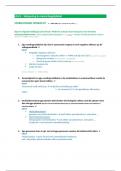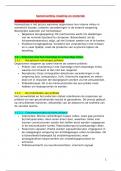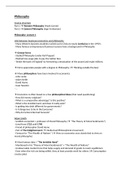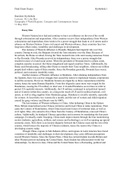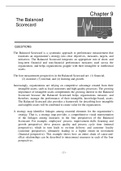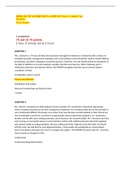"Natural Law is ineffective at dealing with ethical issues" (30)
Natural Law is an ethical system that provides a hybrid approach of both deontological and
teleological aspects. This means that Natural Law is both duty based and focuses on the
consequences of a moral agent's actions. Influenced by Aristotle, Aquinas develops the Natural
Law and concludes that humans aim for some goal or purpose, but this is not seen as
Eudaimonia (supreme happiness). He also says that humans are "made in the image of God",
and that God has instilled natural inclinations in all humans to behave in certain ways leading us
to the highest good, and so that we can discover the precepts or laws that were built into us.
The 5 primary precepts are: reproduction, preservation of life, nurture and education, living
peacefully in society and worshiping God. The term "ineffective" is defined as something that is
not convincing. This essay will conclude that Natural Law is ineffective at dealing with ethical
issues, for example abortion and euthanasia.
Natural Law is seen as effective because it gives clear cut guidance through the primary
precepts which establish flexible and adaptable secondary precepts to suit dilemmas. Primary
precepts are basic principles that are known innately by everyone, as we all have the same
innate nature that help to point us towards the fundamentals of human flourishing. The primary
precepts are supported by secondary precepts (applications of the primary precepts using
human reason) that are dependent on our own judgement . This indicates that humans act in
accordance with the final purpose and "good" is the very first thing understood by practical
reasoning. There are many specific laws that support Natural Law, as society has been
centered around the principles of the 10 commandments. For example, "do not steal" and the
prohibition of murder leads to an ordered society. Therefore, we can deal with ethical issues
effectively because of Natural Law being a simple, universal guide that judges the moral value
of human creations and it applied to the same people at all times, regardless of race, gender or
age.
However, we live in a post-modern society where people don't accept deontological rules
anymore, making it seem irrelevant. This is because Natural Law is based on the idea that God
created us and we all have a god-given reason, but this is meaningless to many. Natural Law
does not consider additional issues, such as quality of life in issues such as euthanasia, which
is the action of allowing a terminally ill person to die with dignity and avoid pain and suffering.
Natural Law would argue that it breaks the primary precepts of preservation of life and worship
which defies religious beliefs of the sanctity of life but is acceptable through the "heavy use of
sedation" (lan Harris). Therefore, Natural Law is ineffective at dealing with ethical issues as
moral problems can't be solved with simple rules.
Natural Law is effective at dealing with ethical issues as it is ordained by God and rooted in
scripture. For example, Aquinas' Natural Law is the basis for the morality of the Catholic Church,
and is considered the morality of reason that is based on the Bible and understanding of the
natural world. The Catholic Church also claims to be an interpreter for the Divine Law (God's
Laws revealed through scriptures and holy books such as the 10 commandments) and Natural
Natural Law is an ethical system that provides a hybrid approach of both deontological and
teleological aspects. This means that Natural Law is both duty based and focuses on the
consequences of a moral agent's actions. Influenced by Aristotle, Aquinas develops the Natural
Law and concludes that humans aim for some goal or purpose, but this is not seen as
Eudaimonia (supreme happiness). He also says that humans are "made in the image of God",
and that God has instilled natural inclinations in all humans to behave in certain ways leading us
to the highest good, and so that we can discover the precepts or laws that were built into us.
The 5 primary precepts are: reproduction, preservation of life, nurture and education, living
peacefully in society and worshiping God. The term "ineffective" is defined as something that is
not convincing. This essay will conclude that Natural Law is ineffective at dealing with ethical
issues, for example abortion and euthanasia.
Natural Law is seen as effective because it gives clear cut guidance through the primary
precepts which establish flexible and adaptable secondary precepts to suit dilemmas. Primary
precepts are basic principles that are known innately by everyone, as we all have the same
innate nature that help to point us towards the fundamentals of human flourishing. The primary
precepts are supported by secondary precepts (applications of the primary precepts using
human reason) that are dependent on our own judgement . This indicates that humans act in
accordance with the final purpose and "good" is the very first thing understood by practical
reasoning. There are many specific laws that support Natural Law, as society has been
centered around the principles of the 10 commandments. For example, "do not steal" and the
prohibition of murder leads to an ordered society. Therefore, we can deal with ethical issues
effectively because of Natural Law being a simple, universal guide that judges the moral value
of human creations and it applied to the same people at all times, regardless of race, gender or
age.
However, we live in a post-modern society where people don't accept deontological rules
anymore, making it seem irrelevant. This is because Natural Law is based on the idea that God
created us and we all have a god-given reason, but this is meaningless to many. Natural Law
does not consider additional issues, such as quality of life in issues such as euthanasia, which
is the action of allowing a terminally ill person to die with dignity and avoid pain and suffering.
Natural Law would argue that it breaks the primary precepts of preservation of life and worship
which defies religious beliefs of the sanctity of life but is acceptable through the "heavy use of
sedation" (lan Harris). Therefore, Natural Law is ineffective at dealing with ethical issues as
moral problems can't be solved with simple rules.
Natural Law is effective at dealing with ethical issues as it is ordained by God and rooted in
scripture. For example, Aquinas' Natural Law is the basis for the morality of the Catholic Church,
and is considered the morality of reason that is based on the Bible and understanding of the
natural world. The Catholic Church also claims to be an interpreter for the Divine Law (God's
Laws revealed through scriptures and holy books such as the 10 commandments) and Natural


